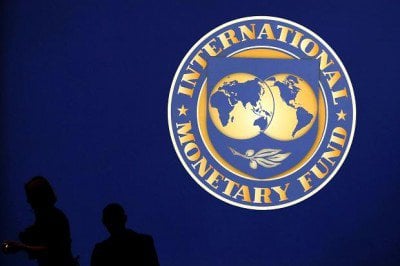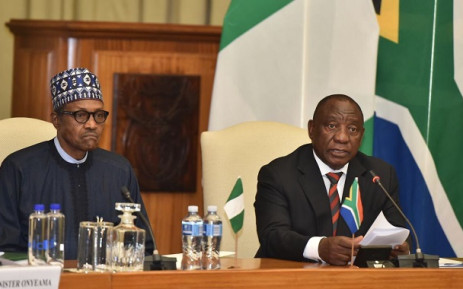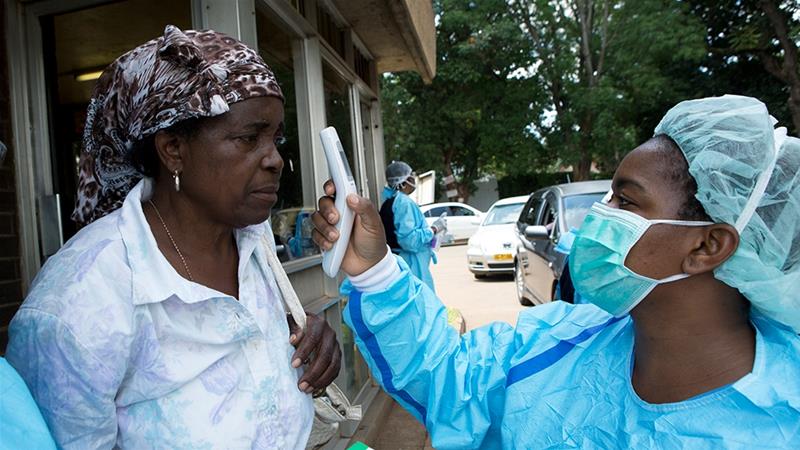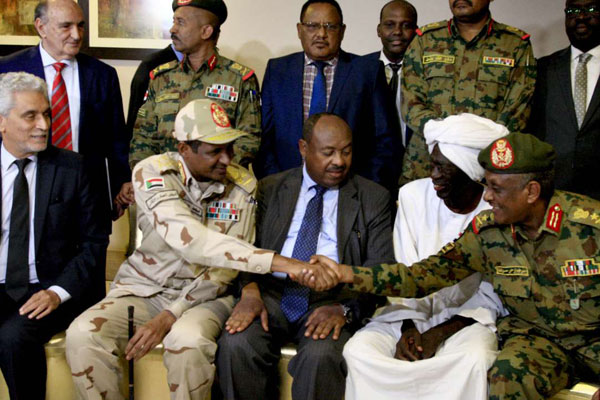Africa, IMF Conditionality and the COVID-19 Pandemic
Governments within the African Union are receiving varying responses to requests for financial assistance

African states across the continent have enacted stringent measures aimed at containing the spread of COVID-19.
From Kenya, to Egypt and South Africa, governmental leaders, labor unions, community organizations and professional groupings are contributing resources and talents to assist in the educational, testing and mitigation measures being implemented within their respective countries.
Although the number of COVID-19 cases have not reached anywhere near the levels prevalent in the Western countries of Europe and North America, efforts designed to halt such a high rate of infection are proving quite costly for the governments involved. Millions of workers and youth have been idled in the labor markets and the educational sectors.
South African President Cyril Ramaphosa and Nigerian counterpart Muhammadu Buhari on state visit
In South Africa, President Cyril Ramaphosa declared a state of emergency in late March, shutting down the country of nearly 60 million people. The president mobilized 3,000 members of the South African National Defense Forces (SANDF) along with 28,000 of healthcare workers in order to enforce the stay-at-home order while carrying out testing for COVID-19 on a mass level.
The South African approach to addressing the pandemic is based upon community outreach, education and testing. Makeshift field centers are being established to pursue active COVID-19 cases for treatment.
An article in the Financial Times says of the South African situation:
“Known as active case finding, the use of community health workers to identify patients with symptoms draws heavily on South Africa’s experience battling tuberculosis and HIV. It differs from the approach of most European governments that have relied on citizens coming forward for tests and then tracing their contacts. John Nkengasong, director of the Africa Centers for Disease Control and Prevention, has lauded South Africa’s aggressive strategy but has warned that Africa overall needs to test more.”
For an underdeveloped country which was liberated from apartheid colonialism 26 years ago, the government led by the African National Congress (ANC) has been able to mount an impressive campaign utilizing the military, media outlets and the medical system to work vigorously towards limiting the crisis. At the end of April the country shifted from level 5 to 4, allowing more movement during certain times of the day.
According to the same above-mentioned report:
“South Africa has increased its level of testing to more than 10,000 tests a day. All the while the number of positive tests has remained consistent at about 3 per cent, a sign that while infections are growing they are not outpacing efforts to find them.”
These extraordinary efforts of course require resources of an enormous magnitude. The outreach project is taking place at a time of high levels of unemployment and declining values for the national currency.
African countries are limited in the cash reserves available to governments to address crises of this magnitude. Some of these states have turned to the International Monetary Fund (IMF) for loans running the risk of further deepening the historical debt burden which has been a major impediment to development since the 1960s.
The IMF and Responses to African States: Sudan and Zimbabwe
In the Republic of Sudan there has been tremendous political and economic upheaval over the last 15 months. A general strike and widespread unrest from December 2018 to April 2019 resulted in a military coup against former President Omar Hassan al-Bashir.
Zimbabwe screening by healthcare workers for COVID-19
A coalition of political organizations and the military have established a Sovereign Council which is governing the country under an interim Prime Minister Abdalla Hamdok. The new government has made serious attempts to stabilize the country and position the transitional regime to receive financial assistance from international finance capital.
Sudan has received pledges from Saudi Arabia and the United Arab Emirates (UAE) aimed at assisting the oil-rich nation during its transition process. However, the IMF, after meeting with leading Sudanese officials, refused to grant loans to the country. The decision related to the denial of funds took place in December 2019, months before the COVID-19 pandemic threat in Africa.
Under the administration of ousted President al-Bashir, Khartoum was designated as a “state sponsor of terrorism.” Al-Bashir and other leaders within his government were also wanted on criminal charges by the International Criminal Court (ICC) over allegations of human rights violations and genocide in relationship to their efforts designed to suppress a rebellion in the western Darfur region of the country.
The IMF wrote in its summary of their decision to deny resources to the country that:
“Sudan is in debt distress and is eligible for debt relief under the Heavily Indebted Poor Countries (HIPC) Initiative. U.S. sanctions on trade and financial flows were revoked in October 2017, but Sudan remains on the state sponsors of terrorism list (SSTL), which blocks progress toward HIPC debt relief and the clearance of debt arrears. Moreover, the large external debt and arrears hinder access to external financing and weigh heavily on development. The team welcomes the authorities’ engagement with international partners to secure comprehensive support for debt relief and the delisting from SSTL, which would pave the way for foreign investment and financing for growth and poverty reduction. The team also welcomed Sudan’s efforts to strengthen cooperation with the IMF on policies and payments.”
Therefore, despite the dire economic and social conditions in Sudan which the IMF acknowledges, they cannot make loans to the interim government due to issues which arose during the previous administration. The notion of the SSTL is a U.S. construct while the IMF and the World Bank are based in Washington, D.C. Even with the advent of COVID-19, the IMF has not altered its decision in regard to Sudan.
Sudan agreement signed on July 5, 2019 by TMC and FFC along with African Union mediator
At the same time in the Southern African state of Zimbabwe, which has also been under the sanctions regime of Washington and other imperialist centers, has as well been denied assistance from the IMF. Zimbabwe President Emmerson Mnangagwa beginning in March mobilized the country in order to contain the spread of COVID-19.
A delegation from the IMF issued a report on the country in February saying that the Zimbabwe African National Union, Patriotic Front (ZANU-PF) government had not met the necessary criteria to acquire loans. The IMF cited previous debt arrears to financial institutions and the ongoing problems of national debt along with currency stabilization.
This IMF report on Zimbabwe reads in part saying:
“Directors stressed the need to address governance and corruption challenges, entrenched vested interests, and enforcement of the rule of law to improve the business climate and support private‑sector‑led inclusive growth. Such efforts would be instrumental to advance reengagement efforts with the international community and mobilize the needed support. They noted with regret that the Staff‑Monitored Program was off‑track and underscored the importance of continued engagement between the Fund and the authorities, including through technical assistance, policy advice and other innovative ways, to help immediately stabilize the economy and address the humanitarian crisis.”
Zimbabwe came under western sanctions due to a radical land reform program initiated by the parliament and the national government under former President Robert Mugabe two decades ago in 2000. The land was returned to the African people whom were expropriated by European settler-colonialism during the late 19thand 20thcenturies. After independence in 1980, the ruling ZANU-PF party waited for twenty years for the British and U.S. governments to make good on their promises made during the Lancaster House negotiations beginning in 1979.
The Lancaster House talks between the national liberation movements and the colonialists led to an agreement on the terms of national independence. Yet the imperialists states refused to provide compensation to the settler-colonial minority in order to facilitate the transferal of land.
Although the IMF recognized the attempts made by the current Mnangagwa administration to re-engage with the imperialist states, there would not be any assistance forthcoming. These conditions are ultimately aimed at the further impoverishment and destabilization of Zimbabwe under ZANU-PF.
Strategic Questions and the Need to Break with the IMF
Undoubtedly the African Union (AU) member states must break with the IMF and the World Bank in order to release the economic potential of the region. The problem of IMF loan conditionality is not a new one on the continent.
Numerous states since the post-independence era have been strangled by IMF/World Bank policies. The measures required by these Washington-based financial institutions serve to heighten tensions between governments and their people as well as hampering the construction of sound state structures needed for national infrastructural development.
This pattern is obviously continuing in the era of COVID-19. Although the IMF has announced aid to certain African governments, others are excluded. These policies could easily create divisions among various states in the scramble for resources to address the looming healthcare and socioeconomic crises.
The U.S. and other imperialist countries became wealthy and dominant due to their exploitation of African people, resources, land and waterways. Only the total liberation of the African people from capitalism and imperialism can provide a path towards effectively addressing the challenges of the contemporary period.
*
Note to readers: please click the share buttons above or below. Forward this article to your email lists. Crosspost on your blog site, internet forums. etc.
Abayomi Azikiwe is the editor of Pan-African News Wire. He is a frequent contributor to Global Research.
All images in this article are from the author unless otherwise stated; except for the featured image




